Student file of Etadleuh Doanmoe, a member of the Kiowa Nation, who entered the school on October 27, 1879 and ultimately departed on January 2, 1888. The student did not attend the school continuously, but left and reentered. The file contains student information cards, a photograph, and a newspaper clipping. The files indicate that Doanmoe…
Doanmoe, Etadleuh
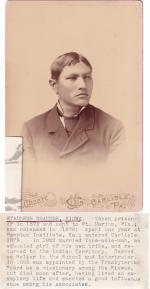

Student information card of Etadleuh (here Etahdleuh) Doanmoe, a member of the Kiowa Nation, who entered the school on October 27, 1879 and departed on January 2, 1888.
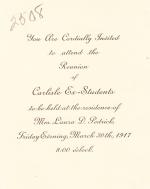
Student file of Laura Doanmoe, a member of the Kiowa Nation, who entered the school on October 27, 1879 and ultimately departed on July 8, 1889. The student did not attend the school continuously, but left and reentered. The file contains student information cards, newspaper clippings, correspondence, a former student response postcard, and a…
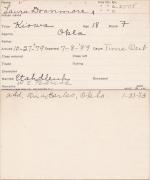
Student information card of Laura Doanmoe (here Doanmore), a member of the Kiowa Nation, who entered the school on October 27, 1879 and departed on July 8, 1889. The file indicates Doanmore was married and living in Anadarko, Oklahoma in 1913.
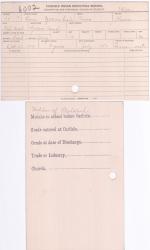
Student file of Owen Yellow Hair, a member of the Kiowa Nation, who entered the school on October 27, 1879 and departed on July 1, 1882. The file contains a student information card.
In school documentation Owen Yellow Hair's name is also spelled Owen Yellow hair. He is also known as Yellow Head and Odle-quat-kuh.
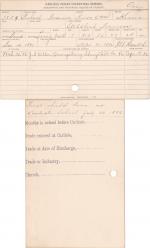
Student information card of Richard Doanmoe, a member of the Kiowa Nation, who entered the school on December 14, 1891 and departed on April 21, 1892. The file indicates Doanmoe was the first child born at the Carlisle School on July 23, 1886.

Student information card of Richard Doanmoe, a member of the Kiowa Nation, who entered the school on December 14, 1891 and departed on April 21, 1892.
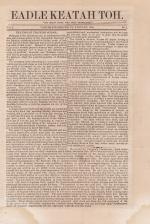
The first page opened with an article titled "THE INDIAN TRAINING SCHOOL," that described the progress of the school, its Christian methods, the work of the former Ft. Marion prisoners of war preparing buildings for use, the importance of the town Sunday Schools, the school curriculum that emphasized farmwork for boys and housekeeping for girls…
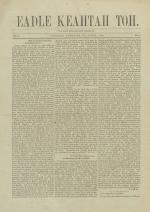
Page one opened with a teacher identified as A.J.S. (Alfred J. Standing) reminiscing about his time teaching Native Americans before he came to Carlisle. Also on the page was an article signed by "G. Le R. B." (George Le Roy Brown) on the civilization of the Indians, comparing it to the conquests of the Roman Empire and its assimilation of less…
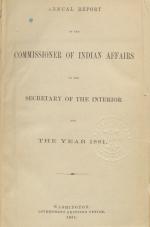
An excerpt from the Annual Report of the Commissioner of Indian Affairs to the Secretary of the Interior for the fiscal year ending 1881, containing the second annual report of the Carlisle Indian School. The lengthy report includes discussions of curriculum, student recruitment, the school's campus, the success of the sending students on…
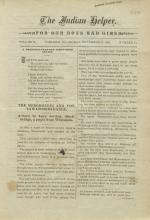
The first page opened with a poem titled "A Fourteen-Year-Old Girl's Good Advice," followed by an article called "The Menomonees and Pottawatomies Dance: A Story by Lucy Jordan, Stockbridge, a pupil from Wisconsin," that told of an 1882 visit by dancers to her home agency in Keshena, Wisconsin. Page two included an offer of photographs for new…
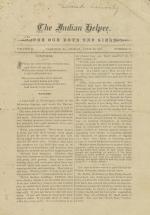
This issue opened with a poem titled “Kindness” followed by a reprint from the Word Carrier, “Manners” that compared ill-mannered behavior to animal traits and was intended as a lesson to Carlisle students. Also on that page was a paragraph reprinted from the Genoa Indian School describing a farming contest challenge between the Genoa…
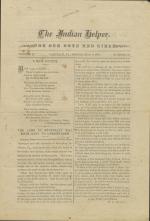
The Indian Helper opened with a poem titled “A New Citizen,” written by Elsie Fuller (Omaha) who was a student at Hampton Institute, reprinted from “Talks and Thoughts.” The next article was an explanation of the Dawes Act written by Sen. Henry Dawes and titled “THE LAND IN SEVERALTY BILL MADE EASY TO UNDERSTAND.” Page two was taken up…
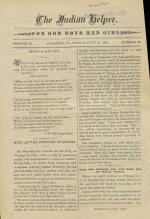
The first page opened with the poem "What a Jug Did," reprinted from An Old Scrap Book followed by a piece called "Nice Letter from Mr. Standing," made up of abstracts from his trip West returning Carlisle students to their home agencies. Standing mentioned there was a special travel car for girls and sick students, and described his…
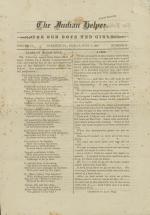
This issue opened with a poem titled “CLASS OF INDIAN BOYS,” written by a Quaker farm wife about a group of Outing students. The next article was titled “A TRIP” by Katie Grinrod (Wyandotte), which gave the account of her and Clara Cornelius’(Oneida) trip to Philadelphia with their Outing family. Page two opened with “A Better Chance” that…
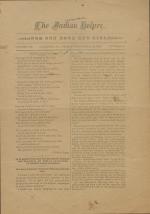
The first page opened with the poem, "Work and Play," followed by a reprint of Dennison Wheelock's first prize essay entitled, "Is It Right for the Government to Stop the Teaching of Indian Languages in Reservation Schools," arguing for the affirmative. The second page featured news about students who returned home after completing their terms…
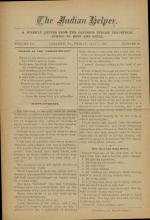
The first page opened with a poem "Legend of the 'Forget-Me-Not, '" "From the Scrap-book of a subscriber;" followed by an article called "Happy Accidents," about the importance of self-help. Next came a piece that continued on the fourth page entitled "How Boys Can Make Money." Page two began with the news of the death of Etahdleuh Doanmoe,…
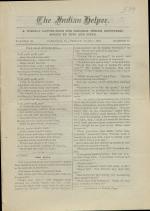
The first page opened with a poem, "The Old Steam Mill," followed by a fictitious conversation between two Carlisle Indian School students, Tom and Ben discussing the merits of work and study. It continued on page four. Page two included news from Pine Ridge Agency, and of the Standing family’s trip to Liverpool, the value of repeating unknown…
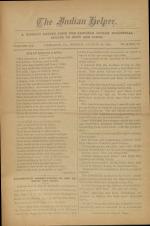
The first page opened with the poem, “What Makes A Man,” followed by an article titled, “Interesting Observations At the Indians’ Own Home” reprinting a letter from Joshua Given (Kiowa) who described the social and political news from the Kiowa and Comanche Agency. He reported the activities of students who had returned home from Carlisle. The…
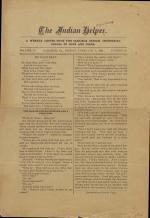
The first page began with a poem titled “Do Your Best,” followed by “The Man-On-the-Band-Stand and a Stranger,” which described the “old gentleman’s” effort to thwart the hiring of an Outing student who was careless with arithmetic. It continued on page four. Page two began with “A Manly Resolution,” that reported Felix Iron Eaglefeather’s (…
![Former Fort Marion prisoners at the Carlisle Indian School [version 1], c.1879 Former Fort Marion prisoners at the Carlisle Indian School [version 1], c.1879](/sites/default/files/styles/views_taxonomy/public/image-photo/Potamkin%20%2323%20%28Choate%20%2328%29%20Full%20040.jpg?itok=i8gRGEsS)
Portrait of White Bear, Zonkeuh, Koba, Henry Roman Nose, Little Chief, Charles Oheltoint, Etadleuh Doanmoe, and White Man posed on the grounds of the school.
![Fort Marion prisoners at the Carlisle Indian School [version 2], c.1879 Fort Marion prisoners at the Carlisle Indian School [version 2], c.1879](/sites/default/files/styles/views_taxonomy/public/image-photo/CIIS%20RG099s%20B1.4%20cropped.jpg?itok=IdQP8Dji)
Portrait of White Bear, Zonkeuh, Koba, Henry Roman Nose, Little Chief, Charles Oheltoint, Etadleuh Doanmoe, and White Man posed on the grounds of the school.

Group portrait of four male students and three female students posed in front of a school building. They have been identified as Etadleuh Doanmoe, Laura Doanmoe, Joshua Given, Charles (Left Hand), Mabel (Little), Fanny (Knife Holder), and Lucius Aitsan (Cute). Etadleuh Doanmoe is wearing a school uniform.
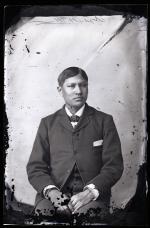
Studio portrait of Etadleuh Doanmoe.
The caption reads: Etahdleuh
![Etadleuh Doanmoe [version 1], c.1885 Etadleuh Doanmoe [version 1], c.1885](/sites/default/files/styles/views_taxonomy/public/image-photo/NAA%2073463.jpg?itok=ujbjsamb)
Studio portrait of Etadleuh Doanmoe.
A handwritten caption along the side of the image probably reads: Etadleuh.
